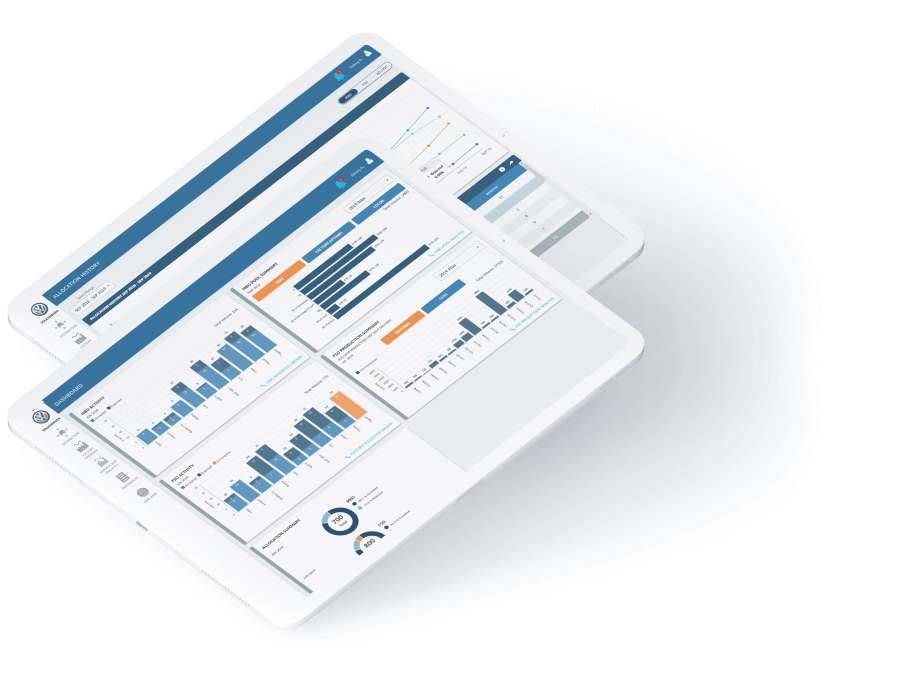Solutions Used
Program Management
Application Upgrade
Company Analytics
Headquarters:
Herndon, Virginia, United States
Employees:
8000+
Industry:
Automotive
Results:
1 Year
Implementation Time
40
Different Portlets
13
Different User Roles
Volkswagen (VW) is an automotive company founded in 1937 in Berlin, Germany. The company is now owned by Volkswagen Auto Group, which also owns: Audi, SEAT, ŠKODA, Bentley, Bugatti, Lamborghini, Porsche, Ducati, Volkswagen Commercial Vehicles, Scania, and MAN. In 2020, VW sold over 350,000 vehicles in the U.S., including bestsellers such as the Golf, Tiguan, Jetta, and Passat. This resulted in their highest U.S. market share since 2013. Volkswagon’s U.S. headquarters are located in Herndon, Virginia, employing 8000 workers who support a network of over 750 dealerships across North America.
Volkswagen’s previous platform was built on Liferay 6.2. It only provided basic volume level ordering and was nearing the end of its lifecycle.
VW also had other tools but they were not integrated with their portal thus creating inefficiencies. VW needed all of its resources integrated into an all-in-one B2B solution.
Volkswagen required a system that enabled them to source the ideal model of a specific car for the right dealer at the right time based on analytics and their market intelligence, allowing them to avoid the compounding expenses incurred by having vehicles sitting idle on dealership lots.
Although Volkswagen employed Liferay developers, staffing changes necessitated an external contract to take over the project. Veriday, a platinum Liferay Partner in North America, was selected to head the project.
VW wanted to introduce a microservice approach to allow for a more reusable platform, enabling the solution to be comprised of separate components vs one large monolith. This approach allows the new solution to contain MIT and the inventory system within it, and launch new versions without updating it entirely.
The primary focus was ‘bulk’ or ‘fleet’ ordering: being able to fill dealership lots rather than fill individual orders for dealerships.
The previous ordering cycle was monthly. While this business process persists, the new platform aims to also introduce and enable a new ‘ad-hoc’ ordering for ‘port-ready’ vehicles, allowing additional cycles to be opened during the month and providing dealers the opportunity to replenish their inventory more frequently.
Ultimately the goal for the new platform is to achieve better/more frequent ordering, and ensure new vehicles spend less time on dealer lots. This is made possible with the built-in VW Data portlet which allows VW Corporate to make ordering decisions with real-time access to market intelligence. Similarly, vehicles already built are quickly moved from the port and made available to dealers who need them. This will result in financial savings for both Volkswagen Corporate and their dealers and improve the overall customer experience.
Volkswagen wanted a better B2B solution that reduced costs and turnaround time. With their new portal, they have access to better information and analytics that empower them to make informed decisions on their inventory and ordering process.
In the previous solution, there were no corporate processes, only the ability to impersonate a dealership and do tasks on their behalf. It was built on a single portlet with multiple screens and required outsourcing many of its customization needs on to other platforms.
VW’s new solution contains the vehicle allocation engine, MIT forecasting, and VW data for informed decision-making, all within Liferay DXP. The new solution contains 40 different portlets with 10 different corporate roles and 3 dealer roles.
VW Corporate now has the ability to decide how many vehicles they are going to keep, and how many are available to be offered to dealers. With access to details about the dealer size and history, this makes the offering process more precise and ensures vehicles aren’t sitting on dealer lots for too long.
Ultimately, Veriday solved VW’s issues with their old solution by delivering a data-driven B2B commerce portal that supports distribution process decision-making. Veriday’s expertise with Liferay and the microservices approach enabled this project to launch successfully while achieving all of the goals laid out by VW.



